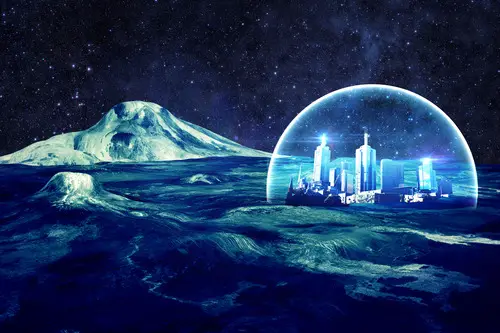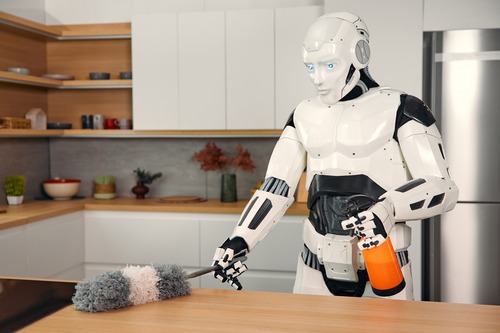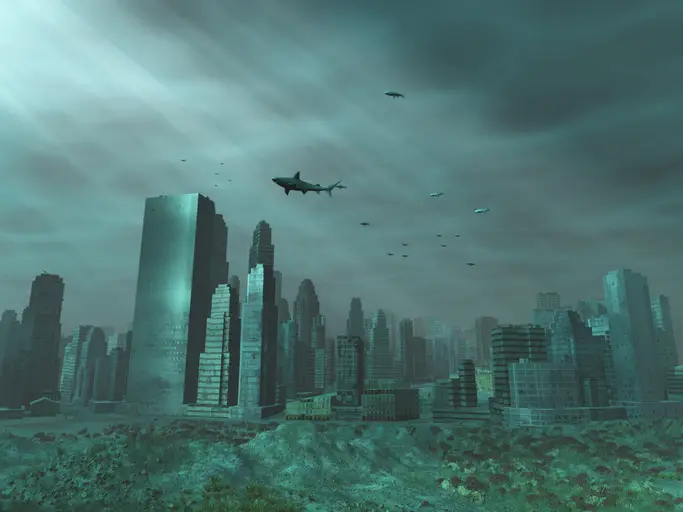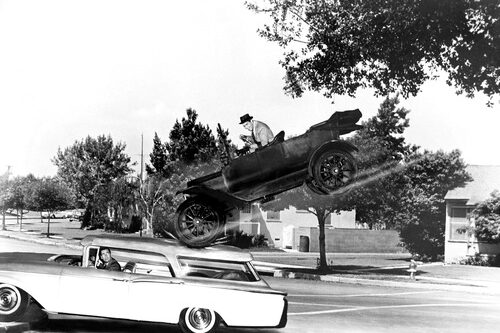1. Colonies on the Moon

In the ’60s, after the Apollo moon landing, some experts predicted humans would have permanent colonies on the moon by 2000. It felt realistic at the time, with the momentum of the space race pushing boundaries every year. Some thought we’d even mine the moon for resources or set up vacation spots for the wealthy.
That dream fizzled as space funding slowed and priorities shifted. The moon remained an awe-inspiring destination, but not one anyone was calling “home.” By 2000, not only were there no colonies, but no human had set foot on the moon in nearly three decades.
2. Robot Maids Doing Chores

Popular culture made many believe that robots would take over household work by the new millennium. Magazines and futurists promised that families in 2000 would have robot maids tidying up, cooking dinner, and even raising children. Rosie from The Jetsons wasn’t just a cartoon character, she was seen as a glimpse of reality.
While robotic vacuums did eventually show up, they hardly compare to the promised full-service helpers. By the year 2000, most people were still vacuuming floors themselves, scrubbing dishes, and doing laundry the old-fashioned way. Robots weren’t running our homes, they were still mostly science fair projects or expensive experiments.
3. A Cure for Cancer

Optimistic predictions in the ’70s and ’80s promised that cancer would be completely cured by 2000. With medical breakthroughs happening so quickly, it seemed believable that such a devastating disease would be conquered in just a couple of decades. Some even thought cancer would vanish as easily as smallpox.
The reality was far more complicated. Treatments did improve dramatically, giving patients more options and higher survival rates. But a single “cure” for cancer didn’t arrive, and the disease remained one of the most stubborn health challenges into the new millennium.
4. Paperless Offices

Experts in the ’80s were convinced that computers would completely eliminate paper by the year 2000. Futurists imagined sleek desks free of clutter, with everything stored digitally on floppy disks or early databases. They thought printers would collect dust and filing cabinets would disappear.
Instead, computers actually created more paper for a while. With easier access to word processors and spreadsheets, people printed more than ever. Offices still relied heavily on paper in 2000, and many didn’t truly start going “paperless” until well into the 2010s.
5. Underwater Cities

In the mid-20th century, some futurists imagined entire cities built under the ocean by 2000. These predictions claimed people would live in transparent domes, farming seafood and exploring the sea as casually as walking outside. With the success of submarines, it didn’t feel entirely impossible.
But the logistics turned out to be daunting. Maintaining oxygen, fighting corrosion, and the sheer cost of construction kept the idea from leaving the drawing board. By 2000, underwater living was still reserved for divers and submariners, not families in bubble homes under the sea.
6. Teleportation Travel

Some sci-fi-inspired predictions said that by 2000, people would teleport from one city to another in seconds. Forget planes, trains, and automobiles, the future was supposed to be instant travel pods that beamed you across the globe. The idea caught on because it felt like the ultimate solution for distance.
Of course, it never came true. Physics and technology just weren’t there, and they still aren’t today. By 2000, the best we had was faster airplanes, and even those were grounded as supersonic travel became too expensive and impractical.
7. The End of Hunger

In the 1970s, futurists were optimistic that global hunger would be solved by the turn of the century. They predicted advances in farming, food technology, and international cooperation would eliminate starvation. Many thought every person on Earth would have access to nutritious meals.
Sadly, that dream proved overly optimistic. Hunger and food insecurity were still pressing issues in 2000, and continue even today. While technology improved farming and food distribution, politics, poverty, and inequality kept the problem from disappearing.
8. Everyone Working Just 20 Hours a Week

Futurists in the 1950s believed technology would make work so efficient that people would only need to work 20 hours a week by 2000. Machines would do the heavy lifting, computers would handle calculations, and humans would spend their extra time relaxing and enjoying life.
Instead, technology didn’t eliminate work, it often created more of it. By 2000, many people were still working 40 hours or more, with email and cell phones making it even harder to disconnect. Instead of more leisure, work seemed to follow people everywhere.
9. Cities Covered by Glass Domes

Architects once predicted that by 2000, pollution would become so bad that cities would have to be sealed under giant glass domes. These futuristic shelters would filter air, control weather, and keep the population safe from outside conditions. The vision was both terrifying and fascinating.
Thankfully, it never came to pass. While pollution remained a problem, the technology and cost of building city-sized domes made it impossible. Instead of domes, cities relied on environmental regulations, cleaner technology, and sometimes just putting up with smoggy skies.
10. No More Schools, Just Learning at Home by Computer

As early as the 1960s, some people predicted that by 2000, traditional schools would vanish. Kids would learn everything at home on personal computers, guided by software instead of teachers. The vision painted classrooms as obsolete, replaced by digital tutors.
But schools didn’t disappear. While computers became part of education, they didn’t replace the experience of classrooms, teachers, and classmates. By 2000, most kids were still riding the bus, sitting in desks, and passing notes instead of logging into a futuristic classroom at home.
11. A World Without War

Idealists in the 20th century hoped that by 2000, nations would finally learn to live in peace. They imagined technology, diplomacy, and shared progress would end war altogether. Some even believed that global governments or cooperation would make conflict unnecessary.
Sadly, war didn’t end. By 2000, conflicts were still happening around the world, and peace remained elusive. The hope of a completely war-free planet turned out to be one of the most unrealistic predictions of all.
12. Immortality Through Technology

Perhaps one of the wildest predictions was that humans would become immortal by 2000. Futurists speculated about organ replacements, cybernetic enhancements, and breakthroughs in anti-aging science that would let people live forever. The year 2000 was painted as the dawn of eternal youth.
Reality was far less glamorous. People were still aging, still getting sick, and still facing mortality. While medicine had advanced, immortality was nowhere in sight. By the time the new millennium arrived, people were still blowing out birthday candles the old-fashioned way, counting the years instead of stopping them.
13. Flying Cars for Everyone

By the time the year 2000 rolled around, many people thought traffic jams would be a thing of the past. Predictions from magazines and futurists in the mid-20th century painted a picture of families zipping around in sleek flying cars like something out of The Jetsons. It sounded exciting and convenient, especially for anyone stuck in rush-hour gridlock.
But reality had other plans. While a few prototypes exist even today, flying cars never became a practical option. Safety concerns, sky traffic regulations, and costs made it impossible to put one in every driveway. Instead of flying to work, most of us were still stuck behind the wheel of the same old sedans and minivans.
